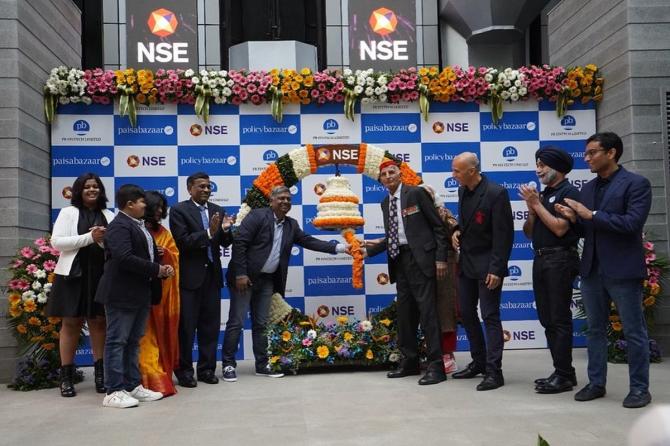 | « Back to article | Print this article |
'My father was asking me what an IPO is. He has no clue and he has never been an investor.'
'My mother, who was the one to ring the bell, has been an investor in Policybazaar for the past 6-7 years and I would say she has made good returns.'

PB fintech, which operates online insurance broker Policybazaar and loan marketplace Paisabazaar, was listed on the bourses recently.
Policybazaar Founder and Chairman Yashish Dahiya spoke to Deepsekhar Choudhury about how the listing will benefit employees, what his parents feel about the IPO, hitting profitability and more.
The flavour of the IPO season is how many employees became millionaires via ESOPs. Do you have a figure in mind?
Roughly 70 employees became millionaires and more than 350 would be crorepatis because of the Policybazaar IPO.
I think those are life-changing sums for those employees.
It is a very positive delta factor for the company that our management churn is very low.
We have been able to retain talent although we are not the highest paymaster.
That does not mean anyone has it easy, but I don't make life hard for anyone either.
Your parents were at the NSE with you. What do they think of your laurels -- IIT, IIM, Ironman, billion dollar startup and now this IPO?
My father was asking me what an IPO is. He has no clue and he has never been an investor.
My mother, who was the one to ring the bell, has been an investor in Policybazaar for the past 6-7 years and I would say she has made good returns.
In fact, we are the only company she has ever invested in.
That was only because I was there and not because she was convinced of the business fundamentals or something (chuckles).
I would feel very happy if my children one day built an organisation from scratch with their friends and took to IPO.
And if they invited me to ring the bell, even better.
You started Policybazaar after your father had a bad experience with an insurance scheme. How much of the problem has been solved today and what remains to be done?
When we started, the insurance protection gap in India used to be 93 per cent and today it is down to 82 per cent.
I think Policybazaar has played a major role in that.
You have to understand that as insurance penetration is growing, people's incomes are also growing and what needs to be protected is also growing.
I think the level of mis-selling that existed in the past is definitely much lower today, with the regulator and all the companies putting in the effort.
I would not knock ourselves too hard -- we have achieved quite a lot in 13 years and there is an immense future that we have to work on. The job is not done.
One view is that you would have grown faster and bigger had regulations been friendlier. Another is that at a time when no one was investing in the insurtech space, you were lucky to have backers like InfoEdge. What is your take?
Insurance is tough anywhere in the world and you will always find it a little difficult to bring about change in a highly regulated sector.
We did not understand the regulatory challenges in the insurance industry when we started.
We did not know what we had bargained for.
I think we have evolved over time and we now appreciate that the regulator is always trying to do the right thing for the consumer.
It takes a bit of time for business and regulation to adjust to each other and there is a balancing act that goes on.
I would say it has been baptism by fire as we learned a lot during the process.
Your contribution margin increased to about 40 per cent in FY21. That came along with premium collected per telemarketer rising 66 per cent to Rs 1.41 crore. How much better can these metrics get?
You will see it improving all the time because as time progresses, customers have a higher propensity to convert.
Currently, we have a better conversion rate than last year, for example.
This is again one of the better things of not having employee churn because employee productivity is based on vintage.
And as your vintage keeps improving, they just become better at the game.
It is that rule of 10,000 hours till you become world class at play.
Do you have a time horizon in mind for hitting profitability?
Unit economics and profitability are frequently misunderstood.
Our core business has been profitable from 2008 when we started.
But we have always been investing in experiments for growth.
We will make every effort to figure out how we communicate to our investors that 'Look, this is our core business and these are our experimental areas.'
I think we will have to figure out a way to marry financial data with the MIS (management information system) so that people can see with clarity what we are doing.
Every large fintech player aspires to become a bank some day. Do you harbour ambitions of becoming a bank or a general insurer?
Those discussions do come up from time to time.
There is an advantage of being an asset-light, open architecture tech platform and as there is to being a manufacturer of insurance policies.
Large companies both want to be a distributor and a manufacturer.
It is something that we will continue to evaluate and for a particular product we might think we need to become a manufacturer.
Feature Presentation: Aslam Hunani/Rediff.com